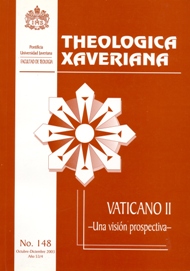Abstract
Si comprendemos la transición como el paso de un sistema a otro, podemos afirmar que el Concilio Vaticano II es una real transición en la vida de la Iglesia. La transición conlleva procesos de avance, de retorno y de aparente invierno, pero el paso ha sido dado, es decir, no puede la realidad eclesial volver a ser la misma que fue antes del citado Concilio. Desde el punto de vista teológico, esta transición conlleva una teología histórica que en primer lugar hace referencia a la cristología como eje de toda teología cristiana; y ello repercute de inmediato en la eclesiología y en el resto de la teología en la Iglesia; teología que desemboca en una espiritualidad con sus consecuencias en el ser y la misión del teólogo como intérprete de la acción de Dios y testigo comprometido con la construcción de la historia en diálogo fecundo con el resto de saberes.This journal is registered under a Creative Commons Attribution 4.0 International Public License. Thus, this work may be reproduced, distributed, and publicly shared in digital format, as long as the names of the authors and Pontificia Universidad Javeriana are acknowledged. Others are allowed to quote, adapt, transform, auto-archive, republish, and create based on this material, for any purpose (even commercial ones), provided the authorship is duly acknowledged, a link to the original work is provided, and it is specified if changes have been made. Pontificia Universidad Javeriana does not hold the rights of published works and the authors are solely responsible for the contents of their works; they keep the moral, intellectual, privacy, and publicity rights.
Approving the intervention of the work (review, copy-editing, translation, layout) and the following outreach, are granted through an use license and not through an assignment of rights. This means the journal and Pontificia Universidad Javeriana cannot be held responsible for any ethical malpractice by the authors. As a consequence of the protection granted by the use license, the journal is not required to publish recantations or modify information already published, unless the errata stems from the editorial management process. Publishing contents in this journal does not generate royalties for contributors.


